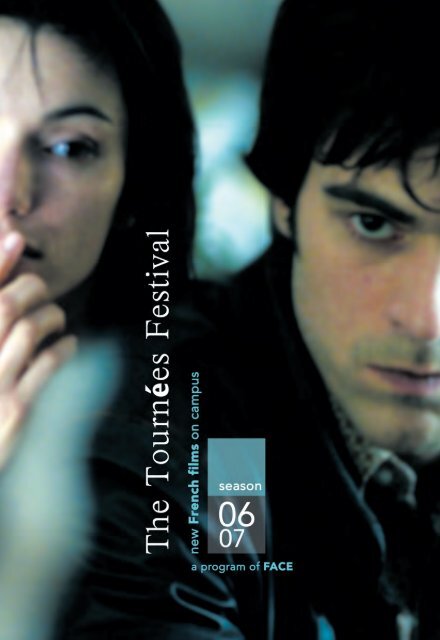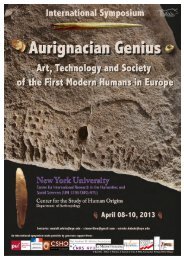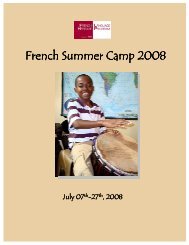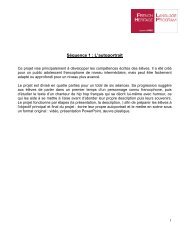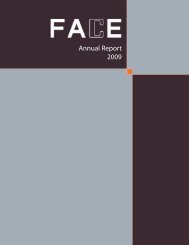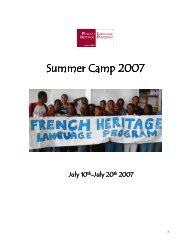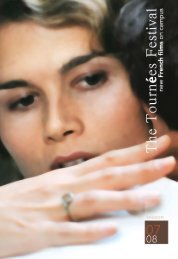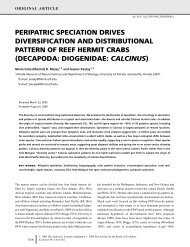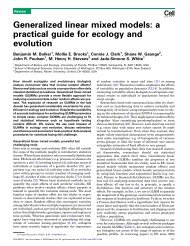The 2006/07 Tournées Festival Book - FACE | French American ...
The 2006/07 Tournées Festival Book - FACE | French American ...
The 2006/07 Tournées Festival Book - FACE | French American ...
You also want an ePaper? Increase the reach of your titles
YUMPU automatically turns print PDFs into web optimized ePapers that Google loves.
THE TOURNÉES FESTIVAL<br />
We invite you to apply for a grant from <strong>The</strong> <strong>Tournées</strong> <strong>Festival</strong>, a<br />
program of <strong>FACE</strong>, designed to help bring contemporary <strong>French</strong><br />
cinema to your college or university campus.<br />
<strong>The</strong> <strong>Tournées</strong> <strong>Festival</strong> was conceived to encourage schools to begin<br />
their own self-sustaining <strong>French</strong> film festivals. Since its inception, the<br />
program has partnered with hundreds of universities and made it<br />
possible for more than 250,000 students to discover <strong>French</strong>-language<br />
films. <strong>The</strong> <strong>Tournées</strong> <strong>Festival</strong> distributes approximately $140,000 in<br />
grants annually. <strong>The</strong> program is made possible with the generous<br />
support of the <strong>French</strong> Ministry of Foreign Affairs, the Centre<br />
National de la Cinématographie, the Grand Marnier Foundation,<br />
the Florence Gould Foundation and the Franco-<strong>American</strong> Cultural<br />
Fund (SACEM, the Writers Guild of America, the Directors Guild of<br />
America and the Motion Picture Association).<br />
This booklet includes descriptions of the latest releases selected by<br />
<strong>FACE</strong> and a complete list of eligible films featured in previous years.<br />
You will also find the information necessary for your application on<br />
pages 2 and 3. Schools will continue to be awarded a grant of $1,800<br />
to show five films. We continue to have two application deadlines,<br />
one on July 31, <strong>2006</strong> for those who wish to program films in the fall<br />
semester, and one on October 1, <strong>2006</strong> for those scheduling their<br />
films for the spring semester.<br />
We are delighted to be able to propose a varied selection of films, a<br />
wide array of genres, many <strong>French</strong> co-productions, and films by<br />
directors ranging from established figures to unique new voices.<br />
We hope you will be inspired by the selection of films on the<br />
following pages, and we look forward to receiving your application.<br />
A bientôt!<br />
Elisabeth Hayes, Executive Director<br />
Delphine Selles, Program Officer<br />
<strong>The</strong> <strong>Tournées</strong> <strong>Festival</strong> <strong>Book</strong> was designed by Laurent Auffret.<br />
<strong>FACE</strong> wishes to thank Wassila Ali Azouz, Marie Bonnel, Agatha<br />
Ciancarelli, Adrienne Halpern, Annette Insdorf, Lucie Loi, Richard Peña,<br />
Patrick Renault, Rachel Spiegel and Jean Vallier for their collaboration<br />
on <strong>The</strong> <strong>Tournées</strong> <strong>Festival</strong> program.
TABLE OF CONTENTS<br />
ELIGIBILITY & GUIDELINES 2<br />
FEATURE FILMS - SEASON <strong>2006</strong>/<strong>07</strong><br />
5 x 2 4<br />
François Ozon<br />
AALTRA 5<br />
Benoît Delépine & Gustave de Kervern<br />
APRES VOUS 6<br />
AFTER YOU - Pierre Salvadori<br />
CACHE 7<br />
HIDDEN - Mickael Haneke<br />
LE CHIGNON D'OLGA 8<br />
OLGA’S CHIGNON - Jérôme Bonnell<br />
CLEAN 9<br />
Olivier Assayas<br />
COMME UNE IMAGE 10<br />
LOOK AT ME - Agnès Jaoui<br />
CRUSTACES ET COQUILLAGES 11<br />
COTE D'AZUR - Olivier Ducastel & Jacques Martineau<br />
DE BATTRE MON CŒUR S'EST ARRETE 12<br />
THE BEAT THAT MY HEART SKIPPED - Jacques Audiard<br />
DELWENDE: LEVE-TOI ET MARCHE 13<br />
DELWENDE - S. Pierre Yameogo<br />
LE DERNIER JOUR 14<br />
THE LAST DAY - Rodolphe Marconi<br />
L’ENFANT 15<br />
THE CHILD - Jean-Pierre & Luc Dardenne<br />
LA <strong>FACE</strong> CACHEE DE LA LUNE 16<br />
FAR SIDE OF THE MOON - Robert Lepage<br />
LA FEMME DE GILLES 17<br />
GILLES' WIFE - Frédéric Fonteyne<br />
INNOCENCE 18<br />
Lucile Hadzihalilovic<br />
L’INTRUS 19<br />
THE INTRUDER - Claire Denis<br />
LA MARCHE DE L'EMPEREUR 20<br />
MARCH OF THE PENGUINS - Luc Jacquet<br />
MONDOVINO 21<br />
Jonathan Nossiter<br />
NATHALIE 22<br />
Anne Fontaine<br />
PAS DE REPOS POUR LES BRAVES 23<br />
NO REST FOR THE BRAVE - Alain Guiraudie<br />
LA PETITE JERUSALEM 24<br />
LITTLE JERUSALEM - K arin Albou<br />
LES PETITS FILS 25<br />
GRAND SONS - Illan Duran Cohen<br />
QUAND LA MER MONTE 26<br />
WHEN THE SEA RISES - G illes Porte & Yolande Moreau<br />
ROIS ET REINE 27<br />
KINGS AND QUEEN - A rnaud Desplechin<br />
LES TEMPS QUI CHANGENT 28<br />
CHANGING TIMES - André Téchiné<br />
WILD SIDE 29<br />
Sébastien Lifshitz<br />
ALTERNATIVE CHOICE LIST 30<br />
DISTRIBUTOR CONTACT INFORMATION 32<br />
ABOUT US 33
ELIGIBILITY & GUIDELINES<br />
2<br />
ELIGIBILITY REQUIREMENTS<br />
To be eligible for a grant, you must be affiliated with an <strong>American</strong> university<br />
or college with non-profit status. Qualifying candidates must show films for<br />
which they are seeking the support of <strong>The</strong> <strong>Tournées</strong> <strong>Festival</strong> as part of a festival<br />
and screenings of all films must take place within a one-month period. <strong>The</strong><br />
festival should consist of at least five films as this is the number of films that<br />
<strong>The</strong> <strong>Tournées</strong> <strong>Festival</strong> grant covers. <strong>The</strong> films may also be presented as part of<br />
a larger festival of <strong>French</strong> or international films. <strong>The</strong> <strong>Tournées</strong> <strong>Festival</strong> grant is<br />
provided for a maximum of five consecutive years.<br />
APPLICATION PROCEDURES<br />
1 | Selecting the films:<br />
Choose five films among the “Featured Films” and “Alternative Choice” titles<br />
and prepare a tentative schedule for the screenings. Films must be shown in<br />
16mm, 35mm or DVD format. Not all films are available on DVD, so choose<br />
according to both your school’s projection equipment and the availability of<br />
the films. Since DVDs are generally available later than film, we encourage<br />
you to check our website (www.facecouncil.org) on a regular basis for updates<br />
on DVD releases. In this brochure, DVD formats are indicated when they<br />
already exist. Also note that some 35mm films are in CinemaScope. Make sure<br />
that your projectionist is aware of the different formats. Please note that <strong>The</strong><br />
<strong>Tournées</strong> <strong>Festival</strong> grant does not cover films shown in VHS. Films are in <strong>French</strong><br />
with English subtitles (unless otherwise noted).<br />
2 | Applying:<br />
Complete the application form (available at www.facecouncil.org/tournees)<br />
and send it to <strong>FACE</strong>. Be as detailed as you can about your proposed festival<br />
and screening dates. If you receive a grant, we realize that the dates you<br />
initially choose may change and we simply ask that you provide us with the<br />
updated information. Please explain why you are interested in this program, if<br />
you will be work ing with other academic departments, and if you already<br />
show foreign films on your campus.<br />
<strong>The</strong>re are two postmark deadlines for applications:<br />
July 31, <strong>2006</strong> and October 1, <strong>2006</strong>. Choose to meet the deadline that is most<br />
convenient for you. We will only accept one application per institution per<br />
year. Late applications will not be considered. You will receive notification<br />
within three weeks of the respective deadlines.<br />
IF ACCEPTED: HOW TO ORGANIZE THE SCREENINGS ON YOUR CAMPUS<br />
3 | Contacting the distributors:<br />
Contact the U.S. distributor of each film and arrange for the reservation,<br />
shipping, and payment of projection rights for all films, including DVDs. As<br />
some titles may not be available for booking until late fall, check with the<br />
distributor before finalizing your program dates. You can organize your film<br />
festival whenever you like during the academic year, between September 1,<br />
<strong>2006</strong> and June 30, 20<strong>07</strong>. Be sure to inform the distributors that you are<br />
participating in <strong>The</strong> <strong>Tournées</strong> <strong>Festival</strong>.<br />
4 | Raising additional funds:<br />
<strong>The</strong> <strong>Tournées</strong> <strong>Festival</strong> Grant may not cover all your expenses. In addition to the<br />
rental fees (which range from $200 to $600 per film) you will be charged a<br />
shipping fee for film prints. Rental rates are subject to distributors’ discretion<br />
and are out of our control. However, they may be negotiable.
3<br />
We recommend that you collaborate with other academic departments or<br />
student groups, or seek private commercial sponsors in your community in an<br />
effort to find additional funding. You may also charge admission for your<br />
screenings.<br />
5 | Publicizing your screenings:<br />
Try to show your films to as large an audience as possible. Publicize them in<br />
your community. Contact other academic departments, cultural institutions,<br />
and high schools nearby that might be interested in <strong>French</strong> films. Place an ad<br />
in your local or student newspaper. Put posters up on your campus. Create a<br />
festival website.<br />
<strong>The</strong> <strong>Tournées</strong> <strong>Festival</strong> postcard: you are to use the 500 oversized postcards that<br />
<strong>FACE</strong> will provide. This promotional tool will enable you to promote your<br />
<strong>Tournées</strong> <strong>Festival</strong>, including your larger festival of <strong>French</strong> or international films.<br />
<strong>FACE</strong> will provide several label templates on its website so that you can easily<br />
include all your festival information on the back of the postcard.<br />
ALL PUBLICITY MATERIALS MUST INCLUDE<br />
THE FOLLOWING CREDIT LINE(S):<br />
“ <strong>The</strong> <strong>Tournées</strong> <strong>Festival</strong> was made possible with the support of<br />
the Cultural Services of the <strong>French</strong> Embassy and<br />
the <strong>French</strong> Ministry of Culture (CNC).”<br />
In the event that <strong>The</strong> <strong>Tournées</strong> <strong>Festival</strong> films are being shown as part of a larger<br />
festival, the following must be included after each <strong>Tournées</strong> <strong>Festival</strong> film description:<br />
“presented as part of <strong>The</strong> <strong>Tournées</strong> <strong>Festival</strong>.”<br />
PLEASE NOTE: Your grant is contingent upon the distribution of 500 postcards<br />
and mention of the above credit line(s). We would be grateful if you could<br />
also add our sponsors to your promotional materials:<br />
“<strong>The</strong> Florence Gould Foundation, the Grand Marnier Foundation<br />
and the Franco-<strong>American</strong> Cultural Fund.”<br />
6 | Submitting post-screening materials:<br />
Once you have completed your festival, send us the following documents<br />
before July 1, 20<strong>07</strong>:<br />
- copy of the distributor’s invoice (or a box office report);<br />
- completed post-screening form;<br />
- copy of your festival budget;<br />
- 5 copies of your adapted <strong>The</strong> <strong>Tournées</strong> <strong>Festival</strong> postcard;<br />
- copies of your publicity materials (2 examples of each document);<br />
- any reviews or newspaper articles related to the screenings.<br />
Please be as detailed as possible when answering the questions on the postscreening<br />
form. We will use your post-screening form to evaluate your participation<br />
in <strong>The</strong> <strong>Tournées</strong> <strong>Festival</strong> if you apply the following year. You will receive<br />
the grant within a month after we receive your materials.<br />
Log on to www.facecouncil.org/tournees for quick and easy access to a range<br />
of resources. <strong>The</strong> site includes a list of all eligible films with descriptions and<br />
credits, links to reviews, distributor contact information, publicity stills, and<br />
downloadable forms.
5 x 2<br />
Director: François Ozon<br />
Screenplay:<br />
François Ozon<br />
Emmanuèle Bernheim<br />
Cast:<br />
Marion: Valéria Bruni-Tedeschi<br />
Gilles: Stéphane Freiss<br />
Awards:<br />
Best Actress (Valéria Bruni-<br />
Tedeschi), Pasinetti Award,<br />
Venice Film <strong>Festival</strong> (2004)<br />
Running time: 90’<br />
Production: France, 2004<br />
Rated R (strong graphic<br />
sexuality & language)<br />
Gauge: 35mm, DVD (color)<br />
Distributor:<br />
ThinkFilm<br />
4<br />
A depiction of an emotionally-charged divorce, 5x2 tells the<br />
story of the intense but ill-fated relationship of a couple. In<br />
François Ozon’s inventive portrait of a modern marriage, a<br />
series of vignettes are played out in reverse chronological<br />
order as Marion and Gilles are seen at various moments of<br />
their relationship. When they host a dinner party, an air of<br />
intimacy born of too much wine causes them to reveal sexual<br />
secrets that underscore their differences. During a momentous<br />
moment of their marriage, Gilles fails to show up at the<br />
hospital when their son is born. On their wedding night, Gilles<br />
falls asleep early and Marion has an affair with a stranger. And<br />
finally, they first meet at a resort where Gilles is vacationing<br />
with his long-time girlfriend. <strong>The</strong> film ends as Marion and<br />
Gilles walk off into the sunset. In his new film, François Ozon<br />
transforms a conventional love story into an interesting study<br />
of human behavior. As he explains, “… Starting at the end and<br />
working gradually backwards to the first encounter seemed<br />
like a good way of reaching a true, lucid reading of a couple’s<br />
story. I wanted the audience to see the range of different<br />
emotions two people experience in the course of their lives<br />
together.”<br />
“Mr. Ozon… has an evident fondness for combining earnest melodrama with<br />
self-conscious gimmickry. … <strong>The</strong> real ingenuity of ‘5x2’ lies in his mastery of<br />
emotional shorthand. He tells us very little about the characters and seems<br />
to have encouraged [the actors] not to be too obvious or revealing.”<br />
A.O. Scott, <strong>The</strong> New York Times
AALTRA<br />
Screenplay:<br />
Benoît Delépine<br />
Gustave de Kervern<br />
Cast:<br />
Ben: Benoît Delépine<br />
Gus: Gustave de Kervern<br />
Awards:<br />
FIPRESCI Prize (Benoît<br />
Delépine & Gustave de<br />
Kervern), London Film<br />
<strong>Festival</strong> (2004)<br />
Running time: 92’<br />
Production: Belgium, 2004<br />
Rating: Not rated<br />
Gauge: 35mm, DVD (B&W)<br />
Distributor:<br />
Film Movement<br />
5<br />
Director: Benoît Delépine & Gustave de Kervern<br />
Two neighbors in the Belgian countryside: Gus, a white-collar<br />
worker, and Ben, a farmer, despise one another. One day in the<br />
midst of a fight, an accident with a tractor leaves them both<br />
paralyzed, wheelchair-bound, and spiteful. Rather than feeling<br />
sorry for themselves, the embittered paraplegics decide to seek<br />
revenge against the tractor’s manufacturer, Aaltra. <strong>The</strong>y set out<br />
to Finland, directing their frustrations towards people they meet<br />
on their way. <strong>The</strong>y steal money, food, and even an electric<br />
wheelchair that belongs to an old lady. <strong>The</strong>y abuse people’s<br />
compassion towards them but when they at last reach the<br />
company ’s headquarters, they are in for a big surprise…<br />
Captured in sharp black-and-white photography that<br />
complements its visual gags, A altra undermines conventional<br />
attitudes toward the disabled with its dry wit and acerbic,<br />
vengeful characters. In this film, the disabled protagonists are<br />
simply normal human beings, at times a bit stupid, a bit nasty,<br />
and often funny. Actors Benoît Delépine and Gustave Kervern,<br />
who wrote, directed and co-star, show a distinct flair for<br />
understated physical comedy and politically incorrect humor.<br />
“Masters of underplaying, they [Delépine and Kervern] mine laughs in the<br />
minimal gesture or look, without resorting to slapstick. Dialogue is pared to<br />
a minimum, allowing for the dry visuals to take front and center. <strong>The</strong> cool,<br />
confident camera mostly maintains a passive distance, just observing the<br />
action and letting it cross the widescreen on its own.”<br />
Jay Weissberg, Variety
APRES VOUS<br />
AFTER YOU<br />
Screenplay:<br />
Pierre Salvadori<br />
Benoît Graffin<br />
Director: Pierre Salvadori<br />
Cast:<br />
Antoine: Daniel Auteuil<br />
Louis: José Garcia<br />
Blanche: Sandrine Kiberlain<br />
Christine: Marilyne Canto<br />
Running time: 100’<br />
Production: France, 2003<br />
Rating: Restricted (language)<br />
Gauge: 35mm, DVD (color)<br />
Distributor:<br />
Swank Motion Pictures<br />
6<br />
Antoine is an overzealous headwaiter at a busy Parisian<br />
restaurant. He enjoys taking care of people, the restaurant’s<br />
clients and its staff. After coming to the rescue of Louis, a<br />
perfect stranger who is about to commit suicide, Antoine<br />
begins to feel responsible for him and genuinely wants to help<br />
him. He brings him home, feeds him and houses him, and goes<br />
as far as driving all night to Louis’ grandparents’ home to<br />
intercept his suicide letter. After giving him a crash course on<br />
wine tasting, Antoine helps him get a job as wine steward at<br />
his restaurant. Desperate to help Louis find happiness, and<br />
also to get him out of his hair, Antoine secretly sets out to play<br />
cupid and to find Louis’s ex-girlfriend Blanche, the person<br />
responsible for his depression. When Antoine finally finds<br />
Blanche at the flower shop where she works, his act of<br />
kindness quickly becomes a fiasco: Antoine falls in love with<br />
her himself. <strong>The</strong> three strangers, brought together by chance,<br />
learn that there is a fine line between helping others and<br />
helping oneself.<br />
“Elegantly written, well-thesped comedy is too hermetic and bittersweet to<br />
be laugh-out-loud funny, but sustains a successful ratio of uncomfortable<br />
situations to amusing solutions.”<br />
Lisa Nesselson, Variety
CACHE<br />
HIDDEN<br />
Screenplay:<br />
Michael Haneke<br />
7<br />
Director: Mickael Haneke<br />
Cast:<br />
Georges: Daniel Auteuil<br />
Anne: Juliette Binoche<br />
Pierrot: Lester Makedonsky<br />
Majid: Maurice Benichou<br />
Awards:<br />
Best Director, Cannes Film<br />
<strong>Festival</strong> (2005) Best Director,<br />
Best film, Best Actor (Daniel<br />
Auteuil) European Film Awards<br />
(2005) Best Foreign Language<br />
Film, Los Angeles Film Critics<br />
Association Awards (2005)<br />
Running time: 117’<br />
Production: France / Austria<br />
Germany / Italy, 2005<br />
Rating: Restricted (strong<br />
violence)<br />
Gauge: 35mm, DVD (color)<br />
Distributor:<br />
New Yorker Films<br />
Georges, the television host of a literary magazine, and his wife<br />
Anne are living a perfect life of modern comfort and security.<br />
One day, their world is disrupted when they receive a videotape<br />
from an anonymous source. On it, they discover that their house<br />
had been filmed by a hidden camera. As more tapes arrive<br />
wrapped in drawings that are disturbingly violent and personal,<br />
the walls of security that Georges and Anne have felt around<br />
them begin to crumble. Georges launches his own investigation<br />
and secrets from his past are revealed. As a young child,<br />
Georges was confronted by his parents’ wishes to adopt Majid,<br />
the son of their Algerian farm workers who disappeared in Paris<br />
during the police brutality that followed the October 17, 1961<br />
demonstration. Georges made up a lie about Majid who was put<br />
into foster care. As this memory resurfaces, Georges is faced<br />
with the fact that Majid’s life could have turned out differently if<br />
he had stayed with his family. He could have received an<br />
education but instead endured a life of poverty. A psychological<br />
thriller that masterfully brings the viewer into the story, Caché is<br />
as much a searing commentary on France’s bourgeoisie and its<br />
colonial heritage as it is about father-son relationships.<br />
“ Tempting as it is to dismiss ‘Caché’ as a liberal guilt trip in the guise of a<br />
thriller, it is at the same time hard to deny its creepy, insinuating power. Nor<br />
is it possible to tune out its accusatory message. Civilization and barbarism<br />
are not antithetical, Mr. Haneke insists, but adjacent, perhaps even<br />
identical.”<br />
A.O. Scott, <strong>The</strong> New York Times
LE CHIGNON D'OLGA<br />
OLGA’S CHIGNON<br />
Screenplay:<br />
Jérôme Bonnell<br />
Director: Jérôme Bonnell<br />
Cast:<br />
Julien: Hubert Benhamdine<br />
Alice: Nathalie Boutefeu<br />
Emma: Florence Loiret-Caille<br />
Gilles: Serge Riaboukine<br />
Olga: Delphine Rollin<br />
Awards:<br />
FIPRESCI Prize, Chicago<br />
International Film <strong>Festival</strong><br />
(2003)<br />
Running time: 96’<br />
Production: Belgium / France,<br />
2002<br />
Rating: Not rated (general public)<br />
Gauge: DVD (color)<br />
Distributor:<br />
Strand Releasing<br />
8<br />
Julien and his sister Emma lost their mother a year ago. <strong>The</strong>y<br />
still live with their father Gilles in the house where they grew<br />
up in the Beauce region. <strong>The</strong>y all live with the pain of their<br />
mother’s death, but they are incapable of talking to each other<br />
about it. Set in a small town where most people have left for<br />
their summer holiday, Julien roams aimlessly and falls in love<br />
with a young saleswoman Olga whom he spots in a bookstore.<br />
He unsuccessfully tries to get her attention until he finds out<br />
she is married and has a child. His childhood friend Alice is<br />
trying to get over a painful and abusive relationship. She and<br />
Julien soon find out that they have deep feelings for each<br />
other. In this first feature film, Jérôme Bonnell was able to<br />
create his own personal universe, fresh and full of tenderness.<br />
“Bonnell made a solid and endearing film, where time stops to leave room<br />
for each one of the characters to mature and grow at their own rhythm.”<br />
Thierr y Chèze, Studio Magazine
CLEAN<br />
Screenplay:<br />
Olivier Assayas<br />
Malachy Martin<br />
9<br />
Director: Olivier Assayas<br />
Cast:<br />
Emily: Maggie Cheung<br />
Albrecht: Nick Nolte<br />
Elena: Béatrice Dalle<br />
Irène: Jeanne Balibar<br />
Awards:<br />
Best Actress (Maggie<br />
Cheung), Cannes Film<br />
<strong>Festival</strong> (2004)<br />
Running time: 110’<br />
Production: English / <strong>French</strong> /<br />
Italian / Spanish / Portuguese,<br />
2004<br />
Rating: R (drug content,<br />
language & brief nudity)<br />
Gauge: 35mm, DVD (color)<br />
Distributor:<br />
Swank Motion Pictures<br />
Emily, whose musician partner died of an overdose in Canada,<br />
spends six months in prison on drug charges. When she gets<br />
out, she has one goal in mind: to get her son Jay back. He is<br />
being raised by her parents-in-law and Emily has realized that<br />
she has to turn her life around and come clean. This will not be<br />
easy as few people in her life believe in her and trust her and<br />
many think that she ruined her partner’s life. Emily moves to<br />
Paris, quits the music scene, goes through a methadone<br />
program, and applies for odd jobs to survive. Little by little,<br />
despite expectations that she will fail, Emily changes. She gains<br />
the trust of her father-in-law who travels to Paris to meet with<br />
her and give her a second chance at raising her son. Clean is<br />
about the rock scene and drugs, but more importantly, about a<br />
person’s ability to change. As Olivier Assayas explains, “I wanted<br />
to come back to something more natural… closer to the<br />
essence of my cinematic style that presents human relations in a<br />
more real and heart-warming context.”<br />
“Clean is a movie about a woman who begins in a state of severe disequilibrium<br />
and finds herself… in an opposite state: balance, clarity, relative<br />
peace. <strong>The</strong> fact that it is not solely her triumph makes it no less moving,<br />
and it certainly makes it far more honest than almost every other movie<br />
you’re likely to see about spiritual regeneration.”<br />
Kent Jones, Cinema Scope
COMME UNE IMAGE<br />
LOOK AT ME<br />
Screenplay:<br />
Agnès Jaoui<br />
Jean-Pierre Bacri<br />
Director: Agnès Jaoui<br />
Cast:<br />
Lolita: Marilou Berry<br />
Sylvia: Agnès Jaoui<br />
Etienne: Jean-Pierre Bacri<br />
Pierre: Laurent Grevill<br />
Karine: Virginie Desarnauts<br />
Awards:<br />
Best Screenplay, Cannes Film<br />
<strong>Festival</strong> (2004)<br />
Best Screenwriters,<br />
European Film Award (2004)<br />
Best Screenplay, Stockholm<br />
Film <strong>Festival</strong> (2004)<br />
Running time: 110’<br />
Production: France/Italy, 2004<br />
Rating: PG-13 (brief language &<br />
a sexual reference)<br />
Gauge: 35mm, DVD (color)<br />
Distributor:<br />
New Yorker Films<br />
10<br />
This newest character-rich comedy centers on 20-year-old<br />
Lolita, a stocky, dark-haired aspiring singer acutely aware that<br />
she doesn’t fit into a world ruled by skinny blondes.<br />
Compounding her low self-esteem is her inconsiderate father<br />
Etienne, a jaw-droppingly boorish literary celebrity whom she<br />
worships and despises. Orbiting in Etienne’s sphere of<br />
influence is a retinue of devotees and wannabes, including a<br />
voice coach (played by director Agnès Jaoui) who plots on<br />
behalf of her struggling novelist husband. Brimming with<br />
music, food, and parties, Look At Me paints a vibrant portrait of<br />
the Parisian social whirl, but one which doesn’t gloss over the<br />
undercurrent of backbiting and backstabbing that flows just<br />
beneath the glittering surface. <strong>The</strong> film ends with a heartwarming<br />
country-church recital that affirms the transcendent<br />
power of art.<br />
“Jaoui sets her wryly observant sights on family, artistic ambition and the<br />
tyranny of physical appearance, and the result is a bright, briskly moving<br />
film whose modest scale belies the universality of its themes.”<br />
Ann Hornaday, Washington Post
CRUSTACES ET COQUILLAGES<br />
COTE D'AZUR<br />
11<br />
Director: Olivier Ducastel & Jacques Martineau<br />
Screenplay:<br />
Olivier Ducastel<br />
Jacques Martineau<br />
Cast:<br />
Béatrix: Valéria Bruni-Tedeschi<br />
Marc: Gilbert Melki<br />
Didier: Jean-Marc Barr<br />
Mathieu: Jacques Bonnaffé<br />
Charly: Romain Torres<br />
Awards:<br />
Label Europa Cinemas (Olivier<br />
Ducastel & Jacques<br />
Martineau), Berlin International<br />
Film <strong>Festival</strong> (2005)<br />
Running time: 93’<br />
Production: France, 2005<br />
Rating: Not rated<br />
Gauge: DVD (color)<br />
Distributor:<br />
Strand Releasing<br />
Marc takes his wife Béatrix and their two children to the seaside<br />
house of his youth on a summer vacation. <strong>The</strong> Mediterranean<br />
wind blows, the sea and the heat of summer stoke their desires.<br />
<strong>The</strong>ir daughter Laura leaves for Portugal with her biker<br />
boyfriend. <strong>The</strong>ir son Charlie, age 17, is left to roam around with<br />
his best friend Martin. Sensitive to the charged atmosphere that<br />
exists between Charlie and Martin, Béatrix imagines that her son<br />
is gay. Charlie tries to explain to his parents that he is not gay<br />
but, as he will soon discover, they are more enthralled by their<br />
own love affairs. Béatrix’s lover Mathieu shows up, inventing all<br />
sorts of excuses to steal time with her. Marc’s old flame, the<br />
local plumber appears reviving Marc’s repressed homosexuality.<br />
Complications escalate in a series of misunderstandings but the<br />
story has a happy ending. This typical vaudeville has fast<br />
rhythm, witty dialogue and an energetic storyline that<br />
concludes with an erotically-charged musical number about the<br />
aphrodisiac powers of shellfish.<br />
“Co-writers and directors Olivier Ducastel and Jacques Martineau have<br />
made a romper that doesn’t shy away from sexual frankness or<br />
Mediterranean laissez-faire.”<br />
Desson Thomson, Washington Post
DE BATTRE MON CŒUR S'EST ARRETE<br />
THE BEAT THAT MY HEART SKIPPED<br />
Director: Jacques Audiard<br />
Screenplay:<br />
Jacques Audiard & Tonino<br />
Benacquista, adapted from<br />
James Toback’s “Fingers”<br />
Cast:<br />
Tom: Romain Duris<br />
Robert: Niels Arestrup<br />
Miao-Lin: Linh-Dan Pham<br />
Aline: Aure Atika<br />
Chris: Emmanuelle Devos<br />
Fabrice: Jonathan Zaccaï<br />
Awards:<br />
Best Film, DIrector, Music, Editing,<br />
Supporting Actor, Promising<br />
Actress, Cinematography, César<br />
Awards (<strong>2006</strong>) Best Film Music,<br />
Berlin Film <strong>Festival</strong> (2005)<br />
Running time: 1<strong>07</strong>’<br />
Production: France, 2005<br />
Rating: Not rated (brief scenes of<br />
violence)<br />
Gauge: 35mm, DVD (color)<br />
Distributor:<br />
New Yorker Films<br />
12<br />
In this stylish reinterpretation of James Toback’s 1978 cult neonoir<br />
film Fingers, Jacques Audiard has combined equal parts<br />
Bach and rock, in a groundbreaking Gallic transformation of a<br />
thoroughly <strong>American</strong> genre: gangster-seeking-redemption<br />
film. Twenty-eight-year-old Thomas appears destined to follow<br />
in the footsteps of his slumlord father. Tom is a sleazy real<br />
estate manager who expels squatters from low-rent buildings.<br />
An unexpected encounter with the agent of his late mother<br />
who was a classical musician reignites a long-buried desire for<br />
life as a concert pianist. When the agent proposes an audition,<br />
Tom finds a special teacher and propels himself back into his<br />
almost forgotten world of classical music, even as he continues<br />
to strong-arm deadbeats and other thugs under pressure from<br />
his father. As the conflict between his parents’ widely<br />
disparate spheres intensifies, Tom feels his longing to be a<br />
musician undermining his place in the shadows of the Paris<br />
underworld. Will he find liberation? This City of Lights thriller<br />
has a richly orchestrated mélange of menace, yearning, and<br />
grace.<br />
“A blistering film you feel in the pit of your stomach, a jumpy, edgy piece of<br />
work that thrust us into a personal maelstrom so tortured and intense, the<br />
emotions could be spread with a knife.”<br />
Kenneth Turan, Los Angeles Times.
DELWENDE: LEVE-TOI ET MARCHE<br />
DELWENDE<br />
13<br />
Director: S. Pierre Yameogo<br />
Screenplay:<br />
S. Pierre Yameogo<br />
Cast:<br />
Napoko: Blandine Yameogo<br />
Diarrha: Célestin Zongo<br />
Pougbila: Claire Ilboudo<br />
Bancé: Daniel Kabore<br />
Elie: Thomas Ngourma<br />
Raogo: Jules Taonssa<br />
Awards:<br />
Regard Hope Award, Cannes<br />
Film <strong>Festival</strong> (2005)<br />
Prize of the Ecumenical<br />
Jury-Special Mention,<br />
Cannes Film <strong>Festival</strong> (2005)<br />
Running time: 69’<br />
Production: Burkina Faso<br />
France / Switzerland, 2005<br />
Language: Moore, <strong>French</strong><br />
Rating: Not rated (general public)<br />
Gauge: 35mm, DVD (color)<br />
Distributor:<br />
New Yorker Films<br />
This mother-daughter tale focuses on the injustice of some<br />
traditional African practices and women’s struggle for equality.<br />
A small village in Burkino Faso is devastated by the sudden<br />
death of many of its children. Fearing the worst, Diarrha sends<br />
his daughter Pougbila to get married in another village despite<br />
the objections of his wife Napoko. She learns that their<br />
daughter has been raped, possibly by her own husband and<br />
therefore she accepts the arranged marriage despite her own<br />
reservations. Following a village tradition, the elders conduct a<br />
witch-hunt to find the person responsible for all the deaths. <strong>The</strong><br />
blame falls on Napoko and she is chased out of the village.<br />
Upon learning of her mother’s fate, Pougbila embarks on a<br />
journey to find her. Her travel leads her to the capital,<br />
Ouagadougou, where she finds her mother in a shelter for<br />
women accused of witchcraft. Intent on exposing the truth, she<br />
brings Napoko home and forces the elders to confront the truth:<br />
Diarrha took advantage of a local village tradition in order to<br />
direct the blame towards his wife. Based on a true story,<br />
Delwende examines some traditional customs in Africa and the<br />
role women play in exposing the injustices perpetrated against<br />
them.<br />
“Firmly feminist in outlook and culture-changing in its aspirations,<br />
‘Delwende’ combines aspects of Greek tragedy with a critical eye toward the<br />
misuse of tradition… Like Sembene, Yameogo is enamored with strong<br />
women, and in his lead actresses he’s found a terrific conduit for expressing<br />
their nobility and force.”<br />
Jay Weissberg, Variety
LE DERNIER JOUR<br />
THE LAST DAY<br />
Director: Rodolphe Marconi<br />
Screenplay:<br />
Rodolphe Marconi<br />
Cast:<br />
Marie: Nicole Garcia<br />
Simon: Gaspard Ulliel<br />
Louise: Mélanie Laurent<br />
Marc: Bruno Todeschini<br />
Running time: 105’<br />
Production: France, 2004<br />
Rating: Not rated<br />
Gauge: DVD (color)<br />
Distributor:<br />
Strand Releasing<br />
14<br />
Simon, a sensitive young artist, travels to meet his parents at<br />
their seaside home for the Christmas holiday and in the train,<br />
he meets Louise who invites herself over for Christmas.<br />
Simon’s parents, Marie and Jean-Louis, assume Louise is his<br />
girlfriend. <strong>The</strong> father clearly has no attachment to his son,<br />
preferring his daughter. Simon grows attached to Louise, but<br />
she prefers his best friend, Mathieu. When Marie receives a<br />
phone call from Marc, an ex-lover who also happens to be in<br />
the region, old family stories resurface. Frustrated in her<br />
marriage to Jean-Louis, Marie reconnects with Marc. She soon<br />
discovers that he has not only come to be with her, but also to<br />
meet Simon who, as it turns out, is really his son. Marie learns<br />
that Louise is Marc’s daughter. Marie tells Simon that Marc,<br />
not Jean-Louis, is his father. Marc has already left town and<br />
Louise left with Mathieu. Simon is left alone to deal with the<br />
news, which he is incapable of bearing on his own.<br />
“<strong>The</strong> search for identity. This is the recurring theme which runs through<br />
Rodolphe Marconi’s films. In that respect, his last opus ‘<strong>The</strong> Last Day’ is, without<br />
exaggeration, the best accomplishment.”<br />
Thomas Baurez, Studio Magazine
L’ENFANT<br />
THE CHILD<br />
15<br />
Director: Jean-Pierre & Luc Dardenne<br />
Screenplay:<br />
Jean Pierre & Luc Dardenne<br />
Cast:<br />
Bruno: Jérémie Renier<br />
Sonia: Déborah François<br />
Awards:<br />
Golden Palm, Cannes Film<br />
<strong>Festival</strong> (2005)<br />
Running time: 95’<br />
Production: Belgium / France,<br />
2005<br />
Rating: Restricted<br />
(brief language)<br />
Gauge: 35mm, DVD (color)<br />
Distributor:<br />
New Yorker Films<br />
Dispossessed twenty-year-old Bruno lives with his girlfriend<br />
Sonia in an Eastern Belgian steel town. <strong>The</strong>y live off Sonia’s<br />
unemployment benefits, panhandling, and the petty thievery of<br />
Bruno and his gang. <strong>The</strong>ir lives change forever when Sonia gives<br />
birth to their child Jimmy. She returns home from the hospital<br />
to learn that Bruno has sublet their apartment to total strangers.<br />
<strong>The</strong> two are forced to make do under a highway bridge. Bruno<br />
feels little attachment to their baby and Jimmy becomes little<br />
more to him than a new source of wealth. Desperate for money,<br />
Bruno sells Jimmy through the black market. Upon learning<br />
what Bruno did, Sonia faints and ends up in the hospital.<br />
Realizing his terrible mistake, Bruno sets out to get his baby<br />
back. He eventually does but is forced to come up with the<br />
money that his black market contact lost in the failed deal.<br />
After stealing the day’s earnings from a small store, Bruno and<br />
his young associate are caught during a chase with the police.<br />
Transformed by his newly discovered sense of responsibility to<br />
his son, Bruno steps forward and takes responsibility for the<br />
crime and lands in prison, whereas his young partner goes free.<br />
“<strong>The</strong> brothers have a style and set of interests as instantly recognizable as<br />
any filmmaker in the world - visceral camerawork, impeccable performances,<br />
a concern for Belgium's dispossessed, an unlikely affinity for Robert<br />
Bresson.”<br />
James Hoberman, <strong>The</strong> Village Voice
LA <strong>FACE</strong> CACHEE DE LA LUNE<br />
FAR SIDE OF THE MOON<br />
Screenplay:<br />
Robert Lepage<br />
Director: Robert Lepage<br />
Cast:<br />
Philippe/André: Robert Lepage<br />
<strong>The</strong> Mother: Anne-Marie Cadieux<br />
Carl: Marco Poulin<br />
Awards:<br />
FIPRESCI Prize, Berlin Film<br />
<strong>Festival</strong> (2004)<br />
Best Adapted Screenplay,<br />
Genie Awards (2004)<br />
Best Film, Namur <strong>Festival</strong> of<br />
Francophile Film (2004)<br />
Running time: 105’<br />
Production: Canada, 2003<br />
Rating: Not Rated<br />
Gauge: 35mm, DVD (color)<br />
Distributor:<br />
TLA Entertainment<br />
16<br />
Before Galileo, it was believed that the moon was a polished<br />
mirror, its surface a reflection of the globe. In the 1960s, a<br />
Soviet lunar probe exposed the far side of the moon (which<br />
can never be seen from Earth) as scored and disfigured by the<br />
storms of celestial debris. From this discovery, writer-director<br />
Robert Lepage crafts an engaging metaphor of mysterious<br />
dualities, juxtaposing sibling rivalry with the US-Soviet space<br />
race. Estranged brothers Philippe and André (both played by<br />
Robert Lepage) relive childhood disputes as they dispose of<br />
the belongings of their recently deceased mother. André, a<br />
television meteorologist, has little in common with his older<br />
sibling Philippe. Philippe is a forty-ish doctoral student who<br />
has repeatedly failed to defend his dissertation on human<br />
narcissism and space exploration. He is deeply hurt by the<br />
scientific community’s refusal to acknowledge his work. When<br />
he receives an invitation to go to Russia to present his<br />
theories on the competitive exploration of the cosmos,<br />
Philippe hopes that he will finally gain some recognition. This<br />
captivating cinematic journey probes issues of competition<br />
and reconciliation while searching for meaning in the universe.<br />
“Employing plenty of the director’s signature seamless pans across time and<br />
space, Lepage lyrically fuses childhood memories with present-day sibling<br />
rivalry, archival footage with crisp video… Lepage spins a rich, moving film<br />
that acknowledges humanity’s power to break out of Earth’s daily gravity; in<br />
the process, he leaves audiences floating.”<br />
Mark Peranson, <strong>The</strong> Village Voice
LA FEMME DE GILLES<br />
GILLES' WIFE<br />
17<br />
Director: Frédéric Fonteyne<br />
Screenplay:<br />
Philippe Blasband, Frédéric<br />
Fonteyne & Marion Hänsel,<br />
based on the novel by<br />
Madeleine Bourdouxhe<br />
Cast:<br />
Elisa: Emmanuelle Devos<br />
Gilles: Clovis Cornillac<br />
Victorine: Laura Smet<br />
Awards:<br />
Golden Tulip, Istanbul<br />
International Film <strong>Festival</strong><br />
(2005) Best Belgian Director,<br />
Joseph Plateau Awards (2005)<br />
Best Actress (Emmanuelle<br />
Devos), Mar del Plata Film<br />
<strong>Festival</strong> (2005) CICAE Award,<br />
Venice Film <strong>Festival</strong> (2004)<br />
Running time: 103’<br />
Production: Belgium/France, 2004<br />
Rating: Not Rated<br />
Gauge: 35mm, DVD (color)<br />
Distributor:<br />
<strong>The</strong> Cinema Guild<br />
Set in the 1930’s, Gilles’ Wife is a haunting tale of passion and<br />
sacrifice in a small mining town. <strong>The</strong> wife of a metal worker and<br />
devoted mother, Elisa’s well-ordered world is turned upside<br />
down when she begins to suspect her husband Gilles of having<br />
an affair with her younger sister Victorine. Determined to save<br />
her marriage, Elisa undertakes a strange and disquieting battle<br />
to recover what she has lost, in the hopes of regaining once<br />
again Gille’s attention. Steeped in rich period details, which<br />
recreate the atmosphere of classic <strong>French</strong> cinema of the 1930’s,<br />
the film explores Elisa’s emotional upheaval over the course of a<br />
year. Her suspicion grows but she does not confront her<br />
husband, and when Gilles breaks down and admits to having an<br />
affair, she supports him. Elisa’s determination to win him back<br />
leads her to spy on her sister Victorine on his behalf. When she<br />
discovers that her sister is falling in love with another man,<br />
Elisa’s marriage regains some sense of normalcy until Victorine<br />
announces her plans to marry that man. Gilles, who is still<br />
infatuated with V ictorine, is enraged, wreaking havoc and<br />
leading to a desperate outcome. Virginie Saint-Martin’s<br />
cinematography involves powerful compositions and Vermeerlike<br />
lighting. She deftly captures Elisa’s inner workings.<br />
“Like the best of legendary ‘poetic realist’ films, but done with more sexual<br />
frankness and visual realism, ‘Gilles’ Wife’ mixes naturalism with theatrical<br />
grace. What compels the viewer throughout is both the power of the acting<br />
… and the beauty of the images.”<br />
Michael Wilmington, Chicago Tribune
INNOCENCE<br />
Director: Lucile Hadzihalilovic<br />
Screenplay:<br />
Lucile Hadzihalilovic, based on<br />
the novella “Mine-Haha, or <strong>The</strong><br />
Corporal Education of Young<br />
Girls” by Frank Wedekind<br />
Cast:<br />
Iris: Zoé Auclair<br />
Bianca: Bérangère Haubruge<br />
Mlle Eva: Marion Cotillard<br />
Mlle Edith: Hélène de<br />
Fougerolles<br />
Awards:<br />
Young Director’s Prize, San<br />
Sebastian Film <strong>Festival</strong> (2004)<br />
Best Film & Best<br />
Cinematography, Stockholm<br />
Film <strong>Festival</strong> (2004)<br />
Running time: 115’<br />
Production: France / Belgium<br />
United Kingdom, 2004<br />
Rating: Not Rated<br />
Gauge: 35mm, DVD (color)<br />
Distributor:<br />
Leisure Time Features<br />
18<br />
A subterranean rumbling resonates in the heart of a forest.<br />
Hidden by foliage, a metal grate reveals underground<br />
passageways leading to a boarding school separated from the<br />
outside world by a huge wall. A group of young schoolgirls<br />
opens a coffin only to find six-year-old Iris. Bianca, the oldest<br />
student, introduces Iris to this strange world where there are<br />
neither men nor adults except the old servants and two young<br />
teachers: Mesdemoiselles Edith and Eva. Iris quickly discovers<br />
the rules of the school where teaching centers on dance,<br />
physical education and biology. Obedience is paramount and<br />
any boarder who rebels or escapes is condemned to serve the<br />
others forever. Nothing overly dramatic happens in Innocence,<br />
but the anxiety and fear the film provokes force the viewer to<br />
wonder what will take place next. Everything indicates that<br />
these girls are being groomed for something. Is it a rite of<br />
passage preparing them for puberty and adulthood, or<br />
something sinister? Lucile Hadzihalilovic creates a world<br />
oscillating between realism and fantasy through astute<br />
lighting, intense colors, and virtually no background music.<br />
“Hadzihalilovic steadfastly resists the temptation to explain the strange<br />
universe she presents. Those expecting answers may be frustrated but the<br />
spell cast by her haunting film lingers long after the closing credits, like a<br />
damp mist after a storm.”<br />
<strong>The</strong> Hollywood Reporter
L’INTRUS<br />
THE INTRUDER<br />
19<br />
Director: Claire Denis<br />
Screenplay:<br />
Claire Denis & Jean-Paul<br />
Fargeau, based on the novel by<br />
Jean-Luc Nancy<br />
Cast:<br />
Louis: Michel Subor<br />
Sidney: Grégoire Colin<br />
Young Russian woman: Katia<br />
Golubeva<br />
<strong>The</strong> Pharmacist: Bambou<br />
Queen of the Northern<br />
Hemisphere: Béatrice Dalle<br />
Running time: 130’<br />
Production: France, 2004<br />
Rating: Not rated<br />
Gauge: 35mm, DVD (color)<br />
Distributor:<br />
Wellspring Media<br />
Louis Trebor, a mysterious loner, lives in an isolated cabin in the<br />
woods on the <strong>French</strong>-Swiss border. An enigmatic figure and an<br />
emotionally distant father who seems to prefer the company of<br />
his dogs, Louis has little contact with his grown son Sidney.<br />
Louis’ contacts seem limited to an affair with a local pharmacist<br />
and an unspoken attraction to a beautiful, aloof dog breeder.<br />
An ailing heart forces Louis to leave his snow-covered<br />
wilderness to retrieve money in a bank vault in Geneva to<br />
purchase a new heart on the black market. After recovering<br />
from transplant surgery in Asia, Louis discovers he is being<br />
shadowed by a mysterious, unnamed Russian woman. He begins<br />
a boat voyage south, slowly making his way back to his former<br />
home on a remote island near Tahiti. <strong>The</strong> Intruder is a mysterious<br />
and enthralling story about fresh starts and the possibility of<br />
escape, a tale of both inner and outer travels. Like all of Claire<br />
Denis’ films, it explores the literal and metaphorical borders<br />
where natives and intruders intersect, searching for signs of<br />
home within and beyond the barriers of countries, cultures, and<br />
families.<br />
“An immersion in pure cinema! Beautiful and terrifying in their intensity, the<br />
images will make you gasp.”<br />
Stephen Holden, <strong>The</strong> New York Times
LA MARCHE DE L'EMPEREUR<br />
MARCH OF THE PENGUINS<br />
Screenplay:<br />
Jordan Roberts<br />
Luc Jacquet<br />
Director: Luc Jacquet<br />
Voice Over:<br />
Morgan Freeman<br />
Awards:<br />
Oscar Best Documentary,<br />
Academy Awards, USA (<strong>2006</strong>)<br />
Best Documentary National<br />
Board of Review, USA (2005)<br />
Best Documentary,<br />
Southeastern Film Critics<br />
Association Awards (2005)<br />
Running time: 65’<br />
Production: France, 2005<br />
Language: English<br />
Rating: G<br />
Gauge: 35mm, DVD (color)<br />
Distributor:<br />
Swank Motion Pictures<br />
20<br />
In the Antarctic, every March since the beginning of time,<br />
penguins embark on a quest to find a mate and start a family.<br />
This courtship takes them hundreds of miles across the<br />
continent in freezing temperatures with icy winds and deep,<br />
treacherous waters in the most isolated region on earth. <strong>The</strong>y<br />
risk starvation and attack by predators, but their courage never<br />
falters. After finding a mate the penguins race against the<br />
clock to reproduce, protect their eggs from the icy ground, and<br />
walk hundreds of miles for food. When the egg is hatched, the<br />
male and female continue to take turns protecting their chick<br />
so that the other one can eat. This continues until the chicks<br />
are grown and independent enough to feed on their own.<br />
Director Luc Jacquet and his crew spent thirteen months in<br />
the Antarctic filming the penguins, with no possibility of sea<br />
or air transportation. Though they had to endure -40˚F<br />
temperatures and 100-mile-an-hour winds, their constant<br />
presence allowed them to capture the full and remarkable<br />
variety of penguin behavior. March of the Penguins includes<br />
underwater footage of the penguins’ winter activities never<br />
before captured in such breathtaking detail.<br />
“It’s impossible to watch the thousands of emperor penguins huddled<br />
together against the icy Antarctic blasts… without feeling a tug of anthropomorphic<br />
kinship. <strong>The</strong> feeling that these creatures are brave, indomitable<br />
souls surviving unimaginable physical hardship for the sake of their families<br />
is inescapable.”<br />
Stephen Holden, <strong>The</strong> New York Times
MONDOVINO<br />
21<br />
Director: Jonathan Nossiter<br />
Screenplay:<br />
Jonathan Nossiter<br />
Documentary with<br />
winemakers and wine<br />
consultants in France, Italy,<br />
the USA, England and<br />
Argentina<br />
Running time: 135’<br />
Production: English / <strong>French</strong><br />
Italian / Spanish / Portuguese,<br />
2004<br />
Rating: PG-13 (brief pin-up<br />
nudity)<br />
Gauge: 35mm, DVD (color)<br />
Distributor:<br />
ThinkFilm<br />
For thousands of years, wine has been an important tradition in<br />
many countries. Never has so much pride – and money – been<br />
at stake as today. Never have the battle lines been so clearly<br />
drawn between the old world and the new, between peasants<br />
and millionaires, and between local, artisanal styles of wine<br />
production and multinational, mass-produced ones. <strong>The</strong><br />
ultimate film about wine, Mondovino was filmed over a threeyear<br />
period in France, Italy, the United States, Argentina and<br />
Brazil. Juxtaposing mom-and-pop wine growers with conglomerates,<br />
Jonathan Nossiter, a trained sommelier and wine writer,<br />
intertwines multiple family dramas – some of which play like<br />
soap operas. Through interviews of amateurs, winegrowers,<br />
businessmen, and critics, he uncovers the complex tapestry of<br />
conflicts, conspiracies, and alliances that stem from the<br />
production, distribution, and consumption of wine. Mondovino<br />
gives voice to those who create, critique, sell, and distribute<br />
wine, offering a surprisingly varied, and sometimes controversial<br />
glimpse into something many people enjoy but few people<br />
know much about.<br />
“While not all of the many arguments laid out are fully developed, the<br />
consistently fascinating material provides an uncommonly eloquent,<br />
provocative statement against globalization that’s sure to stimulate<br />
thinking audiences.”<br />
David Rooney, Variety
NATHALIE<br />
Director: Anne Fontaine<br />
Screenplay:<br />
Philippe Blasband<br />
Jacques Fieschi<br />
Anne Fontaine<br />
Cast:<br />
Catherine: Fanny Ardant<br />
Marlène/Nathalie: Emmanuelle<br />
Béart<br />
Bernard: Gérard Depardieu<br />
Running time: 105’<br />
Production: France / Spain, 2003<br />
Rating: Not Rated<br />
Gauge: 35mm, DVD (color)<br />
Distributor:<br />
Koch Lorber Films<br />
22<br />
Catherine is an attractive bourgeois woman with a successful<br />
career and a seemingly solid marriage to Bernard, her husband<br />
of 25 years. <strong>The</strong>ir lives seem to be going well until Catherine<br />
discovers that Bernard is having an affair. Rather than seeking<br />
revenge, she hires Marlène, a prostitute, to sleep with Bernard<br />
in order to discover his sexual fantasies and desires. What<br />
begins is a mesmerizing relationship between two women.<br />
Catherine wants to know the most intimate details and<br />
Marlène provides her with regular reports. In turn, Catherine<br />
dictates what Marlène should or should not do with Bernard.<br />
Expecting to be in control of the situation, Catherine finds out<br />
that she is less in charge than she thought. A woman’s take on<br />
a classic love triangle, N athalie is a film about desire, fantasy,<br />
manipulation, and suspense.<br />
“As a rather naughty slice of erotica it [‘Nathalie’] works brilliantly, with<br />
Ardant and Béart making a fascinating partnership. ‘Nathalie’ plays around<br />
the edges of sexual explicitness by describing rather than showing.”<br />
Jamie Russell, BBC
PAS DE REPOS POUR LES BRAVES<br />
NO REST FOR THE BRAVE<br />
Screenplay:<br />
Alain Guiraudie<br />
Frédéric Videau<br />
23<br />
Director: Alain Guiraudie<br />
Cast:<br />
Basile / Hector: Thomas Suire<br />
Igor: Thomas Blanchard<br />
Johnny Goth: Laurent Soffiati<br />
Bodowski: Vincent Martin<br />
Running time: 104’<br />
Production: France / Austria, 2003<br />
Rating: Not Rated<br />
Gauge: DVD (color)<br />
Distributor:<br />
TLA Entertainment<br />
Take a coming-of-age story, mix in <strong>French</strong> existentialism and<br />
plenty of wit, spice liberally with vivid imagery, and the<br />
refreshingly original, No Rest for the Brave is what you get. <strong>The</strong><br />
film follows the adventures of Basile, an angst-ridden <strong>French</strong><br />
teenager who is convinced that he will die if he falls asleep.<br />
This leads him on a road trip that becomes a hallucinatory<br />
odyssey as he encounters murder, sex and intrigue. Whether<br />
Basile’s excursion is reality or fantasy, innocent or malevolent,<br />
grand ideas mesh with bizarre occurrences to create a<br />
fascinating, surreal journey of discovery, chance, and mystery.<br />
This first feature film is both a gangster road movie and a<br />
comedy. In Alain Guiraudie’s own words, "surrealism is by<br />
definition engaged in social reality. Dreams are fed by reality,<br />
and in turn shine a new light on reality. Cinema must not<br />
content itself with copying life. It's necessary to sublimate the<br />
daily grind and to bridge the gap between reality and utopia.<br />
We have to try, in any event."<br />
“ <strong>The</strong> movie seems to unfold in a parallel universe, a rural France where<br />
sleepy hollows are named for far-flung metropolises, spelled to conform<br />
with <strong>French</strong> pronunciation as if in an Oulipian game (Buenauzerez, Riaux de<br />
J annerot)… That said, ‘No Rest’ remains grounded in a particular social and<br />
economic reality.”<br />
Dennis Lim, <strong>The</strong> Village Voice
LA PETITE JERUSALEM<br />
LITTLE JERUSALEM<br />
Screenplay:<br />
Karin Albou<br />
Director: Karin Albou<br />
Cast:<br />
Laura: Fanny Valette<br />
Mathilde: Elsa Zylberstein<br />
Ariel: Bruno Todeschini<br />
Djamel: Hedi Tillette de<br />
Clermont-Tonnerre<br />
Mother: Sonia Tahar<br />
Awards:<br />
SACD Screenwriting Award,<br />
Cannes Film <strong>Festival</strong> (2005)<br />
Running time: 96’<br />
Production: France, 2004<br />
Rating: Not Rated<br />
Gauge: 35mm, DVD (color)<br />
Distributor:<br />
Kino International<br />
24<br />
La Petite Jerusalem is the nickname of Sarcelles, a low-income<br />
housing neighborhood near Paris. Among the high number of<br />
Jewish immigrants who live there, a Tunisian family of eight<br />
shares a cramped apartment: Laura (a <strong>French</strong>-born, 18-year-old<br />
student), her sister Mathilde, their mother, Mathilde’s husband<br />
Ariel, and the couple’s four children. Independent and strongwilled,<br />
Laura refuses Ariel’s orthodoxy and her mother’s<br />
superstition. Instead, she throws herself into the study of Kant<br />
which leads her to take evening walks. On one such walk, she<br />
meets an Algerian-Muslim immigrant named Djamel. While<br />
Laura’s life is disrupted by their love affair, her sister Mathilde<br />
finds out that her husband is cheating on her. Mathilde turns<br />
to a religious counselor who opens her eyes to the possibility<br />
of sexual pleasure within marriage and to the different ways in<br />
which religious faith can be enacted. Her struggling marriage<br />
is revived, but Laura’s relationship with Djamel becomes<br />
complicated by his family’s disapproval of her. All this is<br />
taking place while tensions between Muslim and Jewish<br />
communities are rising. In her first feature film, Karin Albou<br />
delicately depicts the intimate lives of two women while<br />
raising questions of religious interpretation, freedom, sexuality<br />
and family relationships.<br />
“Her [Karin Albou’s] camera prowls, nimble and alert, attentive to the heft<br />
and texture of things. Close attention is paid to sound design, physiognomy<br />
and the suggestive capacities of unpredictable edits.”<br />
Nathan Lee, <strong>The</strong> New York Times
LES PETITS FILS<br />
GRAND SONS<br />
25<br />
Director: Illan Duran Cohen<br />
Screenplay:<br />
Ilan Duran Cohen<br />
Cast:<br />
Mamie Régine: Reine Ferrato<br />
Guillaume: Guillaume<br />
Quatravaux<br />
Maxime: Jean-Philippe Sêt<br />
Serge: Brice Cauvin<br />
Awards:<br />
Horizons Award, Venice<br />
International Film <strong>Festival</strong><br />
(2004)<br />
Running time: 64’<br />
Production: France, 2004<br />
Rating: Not rated<br />
Gauge: DVD (color)<br />
Distributor:<br />
Strand Releasing<br />
Guillaume often goes to Paris to visit his grandmother Régine<br />
who raised him. He has a hard time dealing with his mother’s<br />
death which occurred two years ago. Although he loves his<br />
grandmother, he is often frustrated by her. She is patient with<br />
him, accepting him as he is. She is also comfortable with his<br />
homosexuality and does not mind that he is seeing an older<br />
man. Nevertheless, she worries about him and expresses her<br />
concern to her late daughter (his mother), whose ashes rest on<br />
the balcony. When Régine hires a housekeeper, Maxime, to help<br />
her, Guillaume is suspicious at first and then jealous of this<br />
young man who has gained his grandmother’s trust. Although<br />
Maxime tries not to get involved, he nonetheless helps<br />
Guillaume deal with his mother’s death and reunites him with<br />
his grandmother. Filmed entirely in the grandmother’s<br />
apartment, the viewer is drawn into the intimate life of the<br />
protagonists and cannot help but be affected by the film’s<br />
emotional honesty, integrity, and humor.<br />
“‘Grand Sons’ is a film of small pleasures, many of which are found in the<br />
performances of Ferrato and Quatravaux, who are utterly natural and seem<br />
to improvise off each other effortlessly. You really feel like you’re spying on<br />
their most private moments in that claustrophobic apartment.”<br />
Don Willmott, Filmcritic.com
QUAND LA MER MONTE<br />
WHEN THE SEA RISES<br />
Screenplay:<br />
Gilles Porte<br />
Yolande Moreau<br />
Director: Gilles Porte & Yolande Moreau<br />
Cast:<br />
Irène: Yolande Moreau<br />
Dries: Wim Willaert<br />
<strong>The</strong> Policeman: Olivier<br />
Gourmet<br />
<strong>The</strong> Journalist: Jackie Berroyer<br />
Awards:<br />
Best First Film, Prix Louis<br />
Delluc ( 2004) Best First Film,<br />
Best Actress, César Awards<br />
(2005)<br />
Running time: 90’<br />
Production: Belgium / France, 2004<br />
Rating: Not Rated<br />
(very brief nudity)<br />
Gauge: 35mm (color)<br />
Distributor:<br />
New Yorker Films<br />
26<br />
When the Sea Rises tells the story of Irène (Moreau), a 45-yearold<br />
actress travelling from one small town to another with her<br />
one-woman show, “Dirty Business.” Slyly funny in her masked<br />
onstage persona, Irene is a genial pro at touring alone,<br />
phoning home to her husband and child and sleeping in a new<br />
hotel each night. Things change when a scooter-driving<br />
vagabond named Dries fixes her stalled car. After accepting an<br />
invitation to her show, Dries soon appears at every stop on her<br />
tour as her “randomly selected” audience participant. What<br />
develops is a remarkably natural and tender affair between<br />
two true eccentrics, their exuberance and playfulness mixing<br />
with a mature, mutual longing.<br />
“Approaches the eloquence of Fellini’s Strada. As you study Ms. Moreau’s<br />
features, the actress reveals so many layers of emotional complexity that her<br />
face becomes a map of the world careworn, childlike and profoundly<br />
beautiful.”<br />
Stephen Holden, <strong>The</strong> New York Times
ROIS ET REINE<br />
KINGS AND QUEEN<br />
27<br />
Director: Arnaud Desplechin<br />
Screenplay:<br />
Arnaud Desplechin<br />
Roger Bohbot<br />
Cast:<br />
Ismael: Mathieu Amalric<br />
Nora: Emmanuelle Devos<br />
Elias: Valentin Lelong<br />
Abel: Jean-Paul Roussillon<br />
Jennsens: Maurice Garrel<br />
Mme Vasset: Catherine Deneuve<br />
Awards:<br />
Best Actor (Mathieu Amalric),<br />
César Awards (2005)<br />
Best Film, <strong>French</strong> Syndicate of<br />
Cinema Critics (2005)<br />
Prix Louis Delluc (2004)<br />
Running time: 150’<br />
Production: France, 2004<br />
Rating: Not Rated (brief nudity)<br />
Gauge: 35mm, DVD (color)<br />
Distributor:<br />
New Yorker Films<br />
Arnaud Desplechin once again traverses the uncharted distance<br />
between comedy and tragedy with this exhilarating work of<br />
intersecting lives and family connections. Invoking everything<br />
from Shakespeare and Hitchcock to Moby Dick, the film is a<br />
heartbreaking, hilarious melodrama of the intrigues and<br />
entanglements of ex-spouses Nora and Ismaël. Ismaël is a<br />
disheveled, neurotic musician who descends into a comic<br />
nightmare when he is committed to a mental hospital by a<br />
mysterious third party. He spars with the steely clinic psychiatrist,<br />
bursts forth with impromptu break-dancing sessions, and<br />
attempts to woo a still-fragile suicide survivor. Vivacious art<br />
dealer and single mother, Nora is struggling to rise above the<br />
calamities of her own romantic life and the looming death of<br />
her ailing father by marrying an icy Parisian businessman.<br />
Because her young son dislikes her fiancé, Nora tries to convince<br />
Ismaël to adopt the child. With its vivid references to<br />
mythology, literature, and cinema, K ings and Queen is an<br />
astonishingly original and thoroughly entertaining take on<br />
modern relationships.<br />
“Desplechin gives these characters the time to develop, to display their<br />
nuances, to establish their relationships with each other, to talk out their<br />
destinies.”<br />
Stephen Hunter, Washington Post
LES TEMPS QUI CHANGENT<br />
CHANGING TIMES<br />
Screenplay:<br />
Laurent Guyot<br />
André Téchiné<br />
Director: André Téchiné<br />
Cast:<br />
Cécile: Catherine Deneuve<br />
Antoine: Gérard Depardieu<br />
Natan: Gilbert Melki<br />
Nadia/Aïcha: Lubna Azabal<br />
Sami: Malik Zidi<br />
Running time: 90’<br />
Production: France, 2004<br />
Rating: Not rated<br />
Gauge: 35mm, DVD (color)<br />
Distributor:<br />
Koch Lorber Films<br />
28<br />
Antoine arrives in Tangiers from Europe to supervise the<br />
building of an audiovisual center. <strong>The</strong> secret aim of his<br />
journey is to link up with Cécile, whom he has continued to<br />
love with a silent passion for more than thirty years. Cécile<br />
emigrated to North Africa and married Natan, a Jewish-<br />
Moroccan doctor. Sami, their son, arrives at his parents’ place<br />
with his girlfriend Nadia, who is raising Saïd, a young child.<br />
Sami and Nadia help each other to pursue their separate<br />
passions. Nadia tries to reconnect with her twin sister, Aïcha,<br />
who lives in Tangiers. Aïcha has distanced herself and refuses<br />
to see Nadia. Sami attempts to reconcile his relationship with<br />
Bilal with his love for Nadia. Antoine tries to win over Cécile<br />
and reignite the passion she once felt for him. While at first<br />
she thought he was crazy and immature, Cécile feels restless<br />
and begins to question her life. When a terrible accident<br />
sends Antoine into a coma, Cécile stays at his bedside in<br />
Tangiers while Natan moves to Casablanca.<br />
“For his eighteenth film, André Téchiné has reunited a mythic couple from<br />
<strong>French</strong> cinema (….) Without being a masterpiece, ‘Changing Times’ is a fine<br />
film for Téchiné, generous, and sentimental.”<br />
MCinema.com – March Kressman
WILD SIDE<br />
29<br />
Director: Sébastien Lifshitz<br />
Screenplay:<br />
Stéphane Bouquet<br />
Sébastien Lifshitz<br />
Cast:<br />
Stéphanie: Stéphanie Michelini<br />
Mikhail: Edouard Nikitine<br />
Jamel: Yasmine Belmadi<br />
<strong>The</strong> Mother: Josiane Stoléru<br />
Awards:<br />
Best Feature Film, Manfred<br />
Salzgeber Award, Berlin (2004)<br />
Special Jury Award, Gijon Film<br />
<strong>Festival</strong> (2004)<br />
Grand Jury Award, Outstanding<br />
International Narrative Feature,<br />
L.A.Outfest (2004)<br />
Running time: 93’<br />
Production: France / Belgium<br />
United Kingdom, 2004<br />
Rating: Not Rated (STRONG<br />
Sexual Content)<br />
Gauge: 35mm, DVD (color)<br />
Distributor:<br />
Wellspring Media<br />
Stéphanie (whose birth name is Pierre) is a transsexual<br />
prostitute who plies her trade in Parisian discos, parks, and hotel<br />
rooms. She lives with Jamel, a 30-year-old North African who<br />
also turns tricks. One night, Stéphanie meets Mikhail, an illegal<br />
Russian immigrant. He soon falls in love with her and she<br />
decides to live with both partners. Summoned to her childhood<br />
home in the north of France by her dying mother Liliane,<br />
Stéphanie tries to provide comfort to a woman who has<br />
difficulties accepting her son’s unconventional sexuality.<br />
Stéphanie is soon joined by Mikhail and Jamel. Together they<br />
form a nurturing web of comfort and support which helps her<br />
gradually make up with her mother. Her childhood is revealed<br />
through flashbacks: a childhood mark ed by the early death of<br />
her father and her sister Caroline, to whom she was deeply<br />
attached. Liliane finally dies in her sleep. Stéphanie buries her<br />
mother and closes the family home, destroying all of Liliane’s<br />
possessions. Back in Paris, Stéphanie, Mikhail and Jamel are<br />
faced with an uncertain future: they live on the margins of a<br />
society that is uncomfortable with people like them. <strong>The</strong><br />
camerawork of Agnès Godard (Beau Travail, Strayed) renders the<br />
film deeply melancholic, sensual, and poetic.<br />
“ Whether the camera is trained on the human body, the architecture of Paris,<br />
the fields of northern France or dancers gyrating in a disco, the movie gives you<br />
the feeling of rediscovering the world, moment by moment, in a revelatory<br />
waking dream. It is a world of layered mysteries, primitive and seething with<br />
latent violence, but exquisitely beautiful.”<br />
Stephen Holden, <strong>The</strong> New York Times
ALTERNATIVE CHOICE LIST<br />
* CinemaScope<br />
30<br />
8 femmes 8 Women - François Ozon, 2002<br />
35, DVD | Swank Motion Pictures<br />
10ème C hambre - Instants d’audience <strong>The</strong> 10th District Court: Moments of Trial<br />
R aymond Depardon, 2004 35, DVD | Koch Lorber Films<br />
A la petite semaine Nickel and Dime - S am Karmann, 2003<br />
35 | <strong>French</strong> Feeling Films<br />
A tout de suite - B enoît Jacquot, 2004<br />
35 | <strong>The</strong> Cinema Guild<br />
Abouna - Mahamet Saleh Haroun, 2002<br />
35, DVD | Leisure Time Features<br />
Amen - Constantin Costa-Gavras, 2002<br />
35, DVD | Kino International<br />
And now... ladies and gentlemen - Claude Lelouch, 2002<br />
35, DVD | Swank Motion Pictures<br />
L’Auberge espagnole - Cédric Klapisch, 2002<br />
35, DVD | Criterion Pictures USA<br />
Bon voyage - Jean-Paul Rappeneau, 2003<br />
35, DVD | Sony Pictures Classics<br />
Bord de mer Seaside - Julie Lopes Curval, 2002<br />
35, DVD | First Run Features<br />
Brodeuses Sequins - Eléonore Faucher, 2004<br />
35, DVD | New Yorker Films<br />
Carnages Carnage - Delphine Gleize, 2002<br />
35*, DVD | Wellspring Media<br />
Les Choristes <strong>The</strong> Chorus - Christophe Barratier, 2004<br />
35, DVD | Swank Motion Pictures<br />
Confidences trop intimes Intimate Strangers - Patrice Leconte, 2004<br />
35, D VD | Swank Motion Pictures<br />
Demonlover - Olivier Assayas, 2002<br />
35, DVD | New Yorker Films<br />
D epuis qu’Otar est parti Since Otar Left... - J ulie Bertuccelli, 2003<br />
35, DVD | Zeitgeist Films<br />
La Dernière lettre <strong>The</strong> Last Letter - Frederick Wiseman, 2002<br />
35 | Zipporah Fims<br />
Les Egarés Strayed - André Téchiné, 2003<br />
35, D VD | New Yorker Films<br />
Elle est des notres She’s One of Us - Siegfried Alnoy, 2003<br />
35 | Leisure Time Features<br />
E n attendant le bonheur Waiting for Happiness - A b derrahmane Sissako, 2002<br />
35 | New Yorker Films<br />
L’Esquive Games of Love and Chance - Abdellatif Kechiche, 2003<br />
35, D VD | New Yorker Films<br />
Être et avoir To Be and To Have - Nicolas Philibert, 2002<br />
35, DVD | New Yorker Films<br />
Le Fantôme d’Henri Langlois Henri Langlois: <strong>The</strong> Phantom of the Cinematheque<br />
J acques Richard, 2004 D VD | Leisure Time Features<br />
Feux rouges Red Lights - Cédric Kahn, 2004<br />
35, DVD | New Yorker Films<br />
Le Fils <strong>The</strong> Son - Jean-Pierre & Luc Dardenne, 2002<br />
16, 35, DVD | New Yorker Films<br />
La Fleur du mal <strong>The</strong> Flower of Evil - Claude Chabrol, 2003<br />
35, D VD | New Yorker Films<br />
Le Grand voyage Grand Voyage - Ismaël Ferroukhi, 2004<br />
35, DVD | Film Movement<br />
Hop <strong>The</strong> Hop - Dominique Standaert, 2003<br />
DVD | Film Movement
TOURNÉES FILMS 2002 | 2004 **<br />
** For film descriptions and information, visit www.facecouncil.org/tournees/index.html<br />
31<br />
L’Homme du train Man on the Train - Patrice Leconte, 2002<br />
35*, DVD | Swank Motion Pictures<br />
Il est plus facile pour un chameau It’s Easier for a Camel...<br />
Valeria Bruni Tedeschi, 2003 35, DVD | New Yorker Films<br />
I ls se marièrent et eurent beaucoup d’enfants Happily Ever After<br />
Yvan Attal, 2004 35, DVD | Kino International<br />
Les Invasions barbares <strong>The</strong> Barbarian Invasions - Denys Arcand, 2003<br />
35, DVD | Swank Motion Pictures<br />
Laissez-passer Safe Conduct - Bertrand Tavernier, 2002<br />
35, DVD | Empire Pictures<br />
Ma vrai vie à Rouen My Life on Ice - O. Ducastel & J. Martineau, 2003<br />
35, DVD | Wellspring Media<br />
Monsieur Ibrahim Mr. Ibrahim - François Dupeyron, 2003<br />
35, DVD | New Yorker Films<br />
Monsieur N. - Antoine de Caunes, 2003<br />
35, DVD | Empire Pictures<br />
Moolade - Ousmane Sembene, 2004<br />
35, DVD (Summer <strong>2006</strong>, TBC) | New Yorker Films<br />
Notre musique - Jean-Luc Godard, 2004<br />
35, DVD | New Yorker Films<br />
Le Papillon <strong>The</strong> Butterfly - Philippe Muyl, 2002<br />
35, DVD | First Run Features<br />
Pas sur la bouche Not on the Lips - Alain Resnais, 2003<br />
35, D VD | Wellspring Media<br />
La Petite Lili - Claude Miller, 2003<br />
35, DVD | First Run Features<br />
Qui a tué Bambi? Who Killed Bambi ? - Gilles Marchand, 2003<br />
35*, DVD | Strand Releasing<br />
R aja - J acques Doillon, 2003<br />
35, DVD | Film Movement<br />
S21: <strong>The</strong> Khmer Rouge Killing Machine - Rithy Panh, 2003<br />
35, D VD | First Run Features<br />
Scènes intimes Sex Is Comedy - Catherine Breillat, 2002<br />
35, DVD | Swank Motion Pictures<br />
Son frère - Patrice Chéreau, 2002<br />
35, DVD | Strand Releasing<br />
Stupeur et tremblements Fear and Trembling - Alain Corneau, 2003<br />
35, DVD | <strong>The</strong> Cinema Guild<br />
Swimming Pool - François Ozon, 2003<br />
35, D VD | Swank Motion Pictures<br />
L a Tr ilogie <strong>The</strong> Trilogy (Cavale On the Run, U n couple épatant An Amazing<br />
Couple, Après la vie After Life) - Lucas Belvaux, 2002 35 | Magnolia Pictures<br />
Tasuma - D aniel Kollo Sanou, 2003<br />
35 | Ar t Mattan<br />
Les Triplettes de Belleville <strong>The</strong> Triplets of Belleville - Sylvain Chaumet, 2003<br />
16, 35, D VD | New Yorker Films<br />
Un long dimanche de fiancailles A Very Long Engagement<br />
J ean-Pierre Jeunet, 2004 35, DVD | Swank Motion Pictures<br />
Une femme de ménage <strong>The</strong> Housekeeper - Claude Berri, 2002<br />
35, D VD | New Yorker Films<br />
Vendredi soir Friday Night - Claire Denis, 2002<br />
35, DVD | Wellspring Media<br />
Viva Laldjérie - Nadir Moknèche, 2003<br />
35, DVD | Film Movement<br />
Yves Saint-Laurent : le temps retrouvé YSL, His Life and Time - David Teboul, 2003<br />
DVD | Empire Pictures
DISTRIBUTOR INFORMATION<br />
32<br />
Art Mattan<br />
535 Cathedral Parkway, #14B<br />
New York, NY 10025<br />
T 212 864 1760 F 212 316 6020<br />
www.africanfilm.com<br />
<strong>The</strong> Cinema Guild<br />
130 Madison Avenue<br />
New York, NY 10016<br />
T 212 685 6242 F 212 685 4717<br />
www.cinemaguild.com<br />
Criterion Pictures<br />
8238-40 Lehigh Avenue<br />
Morton Grove, IL 60053<br />
T 800 890 9494 F 847 470 8194<br />
www.criterionpicusa.com<br />
Empire Pictures<br />
350 Fifth Avenue, Suite 7801<br />
New York, NY 10018<br />
T 212 629 3535 F 212 629 3629<br />
www.empirepicturesusa.com<br />
Film Movement<br />
109 West 27th Street, Suite B<br />
New York, NY 10012<br />
T 212 941 7744 F 212 941 7812<br />
www.filmmovement.com<br />
First Run Features<br />
153 Waverly Place<br />
New York, NY 10014<br />
T 800 229 8575 F 212 989 7649<br />
www.firstrunfeatures.com<br />
<strong>French</strong> Feeling Films<br />
475 NE 5th Street<br />
Boca Raton, FL 33432<br />
T 561 395 7<strong>07</strong>7 F 561 395 7037<br />
www.frenchfeelingfilms.com<br />
Kino International<br />
333 West 39th St., Suite 503<br />
New York, NY 10018<br />
T 212 629 6880 F 212 714 0871<br />
www.kino.com<br />
Koch Lorber Films<br />
22 Harbor Park Drive<br />
Port Washington, NY 11050<br />
T 516 484 1000 F 516 484 4746<br />
www.kochlorberfilms.com<br />
Leisure Time Features<br />
P.O. Box 1201<br />
New York, NY 10009<br />
T 212 267 4501 F 212 267 4501<br />
www.leisurefeat.com<br />
Magnolia Pictures<br />
6 Porter Road<br />
Cambridge, MA 2140<br />
T 617 354 4606 F 617 812 0236<br />
www.magpictures.com<br />
New Yorker Films<br />
85 Fifth Avenue, 11th Floor<br />
New York, NY 10003<br />
T 212 645 4600 F 212 645 3030<br />
www.newyorkerfilms.com<br />
Strand Releasing<br />
6140 W. Washington Boulevard<br />
Culver City, CA 90232<br />
T 310 836 7500 T 310 836 7510<br />
www.strandrel.com<br />
Sony Pictures Classics<br />
550 Madison Avenue, 8th Floor<br />
New York, NY 10022<br />
T 212 833 8846 F 212 833 4190<br />
www.sonyclassics.com<br />
Swank Motion Pictures<br />
Nat. T 800 876 5577 F 314 289 2192<br />
East T 800 876 3344 F 631 434 1574<br />
www.swank.com<br />
ThinkFilm<br />
22 East 22nd street, 5th floor,<br />
New York, NY 10010<br />
T 212 444 7901 F 212 444 7901<br />
www.thinkfilmcompany.com<br />
TLA Entertainment<br />
234 Market Street<br />
Philadelphia, PA 19106<br />
T 215 733 0608 F 215 733 0637<br />
www.tlarealeasing.com<br />
Palm Picture<br />
76 Nineth Avenue, 11th Floor,<br />
New York, NY 10010<br />
T 212 320 3653 F 212 320 3639<br />
www.palmpictures.com<br />
Wellspring Media<br />
419 Park Avenue South<br />
New York, NY 10016<br />
T 212 686 6777 F 212 545 9931<br />
www.wellspring.com<br />
Zeitgeist Films<br />
247 Center Street, 2nd Floor<br />
New York, NY 10013<br />
T 212 274 1989 F 212 274 1644<br />
www.zeitgeistfilm.com<br />
Zipporah Films, Inc.<br />
One Richdale Avenue, Unit 4<br />
Cambridge, MA 02140<br />
T 617 576 3603 F 617 864 8006<br />
www.zipporah.com<br />
Cover image from:<br />
De Battre mon coeur s’est arrêté,<br />
courtesy of New Yorker Films.<br />
Other photographs courtesy of:<br />
<strong>The</strong> Cinema Guild, Film Movement,<br />
Kino International, Koch Lorber Films,<br />
Leisure Time Features, New Yorker<br />
Films, Strand Releasing, Swank Motion<br />
Pictures, ThinkFilm, TLA Entertainment,<br />
Wellspring Media.
ABOUT US<br />
33<br />
<strong>FACE</strong> [ F RENCH A MERICAN C ULTURAL E XCHANGE ]<br />
Setting a new precedent in cultural relations, <strong>FACE</strong> pools private and public<br />
resources to support innovative dialogue and exchange in the fields of<br />
contemporary visual arts, performing arts, music, film, and higher education<br />
between the <strong>French</strong>-speaking world and the United States. As a catalyst for<br />
creativity and the promotion of what is new and excellent on both sides of<br />
the Atlantic, <strong>FACE</strong> strives to develop mutual understanding and cooperation<br />
between <strong>French</strong> and <strong>American</strong> civil societies – face to face.<br />
A public/private partnership: <strong>FACE</strong>, an <strong>American</strong> 501(c)(3) operating<br />
foundation, is based in New York City and works in partnership with the<br />
Cultural Services of the <strong>French</strong> Embassy in the United States.<br />
<strong>FACE</strong> is independently administered by an Executive Director and a Board of<br />
Trustees comprised of <strong>French</strong> and <strong>American</strong> members.<br />
<strong>The</strong> Cultural Services - with a proven track record of successful events and<br />
programs - lends professional expertise and provides general managerial<br />
support.<br />
<strong>FACE</strong> supports programs in all the artistic disciplines as well as higher<br />
education. In addition to <strong>The</strong> <strong>Tournées</strong> <strong>Festival</strong>, its major initiatives are:<br />
Cinema | Ciné2000 “A la carte” grants for <strong>American</strong> film schools to assist<br />
with departmental initiatives in the field of <strong>French</strong> cinema and to sponsor<br />
the exchange of cinema professionals for master classes, conferences, etc.<br />
Visual Arts | Etant donnés: <strong>The</strong> <strong>French</strong>-<strong>American</strong> Fund for Contemporary Art<br />
celebrated its tenth year of activity in 2005. <strong>The</strong> Fund had distributed over<br />
$1.5 million to more than 180 projects during those ten years.<br />
Performing Arts | Etant donnés: <strong>The</strong> <strong>French</strong>-<strong>American</strong> Fund for the<br />
Performing Arts was launched in 1999. <strong>The</strong> goal of the Fund is to encourage<br />
institutions to produce or present theater projects and text-based theatrical<br />
productions either by contemporary <strong>French</strong> playwrights or with the participation<br />
of <strong>French</strong> professionals.<br />
Performing Arts | Act <strong>French</strong>: A Season of New <strong>The</strong>ater from France took<br />
place in the fall of 2005 in New York City. Close to 35,000 people attended<br />
performances and theater-related events which revealed to New York<br />
audiences a broader vision of theater and cultural diversity in France.<br />
Music | <strong>The</strong> <strong>French</strong>-<strong>American</strong> Fund for Contemporary Music created in<br />
2004, is a grant-giving program dedicated to stimulating <strong>French</strong>-<strong>American</strong><br />
cooperation in contemporary music.<br />
Higher Education | T he Fr ench-<strong>American</strong> Fund for University<br />
Partnerships is a grant-giving program which supports the formation of<br />
innovative graduate-level partnerships between institutions of higher<br />
learning in France and the United States.
<strong>The</strong> <strong>Tournées</strong> <strong>Festival</strong>,<br />
a program of <strong>FACE</strong>, is sponsored by :<br />
<strong>The</strong> <strong>Tournées</strong> <strong>Festival</strong>, a program of <strong>FACE</strong><br />
(<strong>French</strong> <strong>American</strong> Cultural Exchange), was launched in<br />
1995 to help build a new public for <strong>French</strong> cinema by<br />
encouraging film screenings on <strong>American</strong> college and<br />
university campuses.<br />
In collaboration with the <strong>French</strong> Ministry of Foreign<br />
Affairs, the Centre National de la Cinématographie,<br />
the Florence Gould Foundation, the Grand Marnier<br />
Foundation and the Franco-<strong>American</strong> Cultural Fund<br />
(SACEM, the Writers Guild of America, the Directors<br />
Guild of America and the Motion Picture Association),<br />
<strong>The</strong> <strong>Tournées</strong> <strong>Festival</strong> supports <strong>French</strong> film screenings<br />
on campuses across the country each year.<br />
<strong>FACE</strong><br />
972 Fifth Avenue, New York, NY 10021<br />
Phone 212 439 1449<br />
Fax 212 439 1455<br />
E-mail info@facecouncil.org<br />
❘■❬<br />
✯❱■❘●▲ ✯▼◗❲<br />
❙❘☎✬❊◗❚❨❲<br />
Website www.facecouncil.org


